JACKIE BROWN
NOT JUST A THEATRE ORGANIST
-oOo-
WAKEY WAKE-AAAAY!
THE MOVE TO TELEVISION
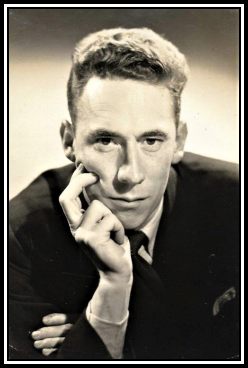 Jackie Brown
Jackie Brown
-oOo-
Between late 1955 and 1974, Jackie worked on a number of successful Television programmes. He went to work as arranger/conductor/pianist on the BBC Radio Programme, The Billy Cotton Band Show, from 1955 until 1968. When the programme was also to be produced for BBC Television, he continued in these positions for the duration of the programmes in its various forms, between 1956 and 1965.
In 1958, Jackie provided the theme music for the successful Associated Television (ATV) series, The Larkins, which ran between 1958 and 1960 and then from 1963 and 1964.
Jackie was also employed to play the Electronic Organ and create Mood Music on the Television Game Show, Double Your Money. Jackie took over from the organist Robin Richmond (1912-1998) who had served as the organist from 1955. Jackie continued to provide the music for this programme until it was taken off the air in 1968.
Later, between 1971 and 1974, Jackie again provided the music for another Game Show, The Sky’s The Limit. The programme was similar to Double Your Money, but here, in addition to winning money, contestants also won miles, which were used for travel.
-oOo-

William Edward Cotton, better known as Billy Cotton (1899-1969), was a band leader and entertainer.
 Billy Cotton
Billy Cotton
During The First World War, he enlisted in the Royal Fusiliers and was recommended for a commission and learned to fly. Following the war, after working at several jobs, he formed his own orchestra, the London Savannah Band in 1924. The Band was noted not only for its music but for its African American trombonist and Tap Dancer, Ellis Jackson. During the Second World War he toured France to entertain the troops and, following its end, joined the BBC.
The Band’s signature tune was Somebody Stole My Gal, which Mr. Cotton was to use throughout his professional life.
Billy Cotton & His Band with vocal by Alan Breeze (1909-1980) – Somebody Stole My Gal
Between 1949 and 1968, he oversaw The Billy Cotton Band Show, which was broadcast during Sunday lunchtime. The Show began with Mr. Cotton yelling Wakey-Wake-aaaay! into the microphone followed by a somewhat frantic version of The Band’s signature tune. In 1956, The Show also appeared on BBC Television where it was presented until 1965.
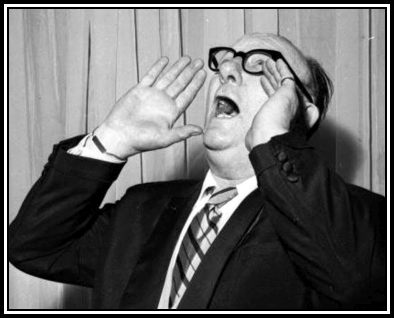
Wakey-Wake-aaaay!
A number of performers appeared with Mr. Cotton for a number of years and included: Alan Breeze, Kathy Kay (1918-2005), Doreen Stephens (1912-1965) and Rita Williams (1920-1971) & The Bandits. Mr. Cotton occasionally featured some of the Band’s musicians, and perhaps, the most popular was the trumpeter, Grisha Farfel (1921-1988).
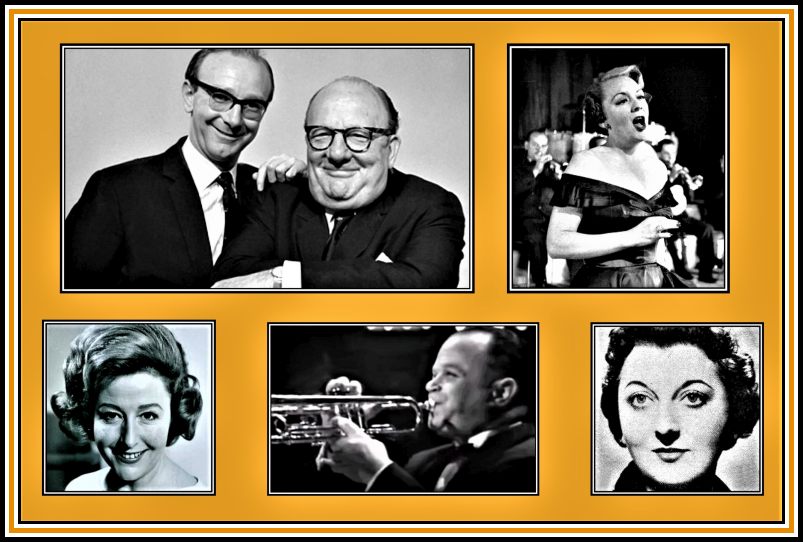 Top Left: Alan Breeze & Billy Cotton; Top Right: Doreen Stephens
Top Left: Alan Breeze & Billy Cotton; Top Right: Doreen Stephens
Bottom Left: Kathy Kay; Centre: Grisha Farfel; Bottom Right: Rita Williams
A number of Special Guests appeared on the television show and included Bob Hope (1903-2003), Russ Conway (1925-2000) and Cliff Richard (1940) amongst the many.
 Billy Cotton with Russ Conway (Left) and Cliff Richard (Right)
Billy Cotton with Russ Conway (Left) and Cliff Richard (Right)
-oOo-
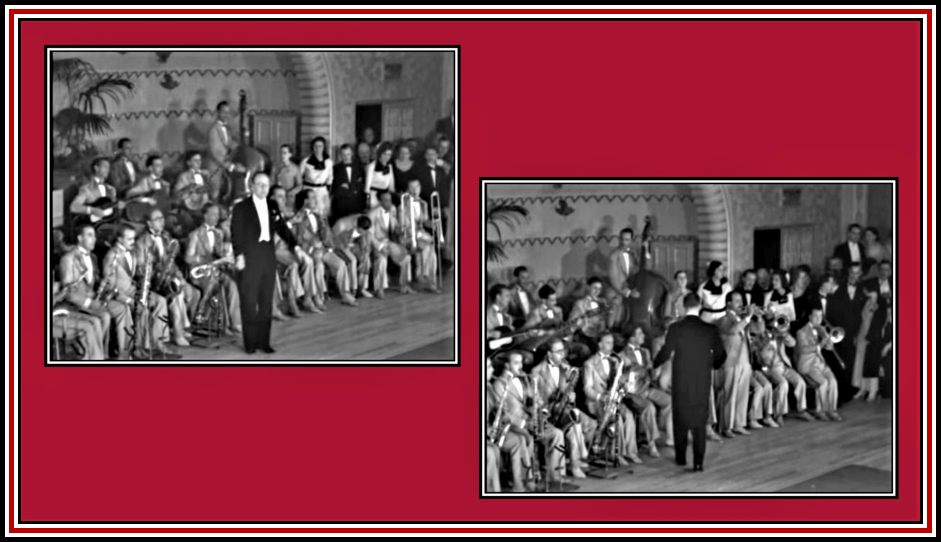 Billy Cotton conducting The Band at the Dance Hall of the Adelphi Theatre Slough.
Billy Cotton conducting The Band at the Dance Hall of the Adelphi Theatre Slough.
This performance was filmed and recorded by British Pathe (1933)
-oOo-
Mr. Cotton was a keen racing driver and raced at the British Grand Prix at Donington in 1938. In his final race in 1949, he finished eighth in the 1949 British Grand Prix held at the Silverstone Circuit, driving an English Racing Automobiles (ERA) vehicle together with David Hampshire (1917-1990).

Billy Cotton was married in 1921 and had two sons, Ted and Sir Bill Cotton, who later became the BBC’s Managing Director of television. In 1962, he suffered a stroke and when he died in 1969, he funeral was held at Westminster Abbey.
-oOo-
 Clem Bernard (1904-1954)
Clem Bernard (1904-1954)
Clem Bernard was born in Edinburgh and studied the piano. In 1925, he joined The Billy Cotton Band when it was in Southport. Over the years of his association with Mr. Cotton, he was responsible for The Band’s stage orchestrations, comedy numbers, choral arrangements and also appeared with Alan Breeze in a number of comic songs and routines. He passed away in November 1954 leaving his wife and two children.
 Clowning with Alan Breeze at the New Hippodrome Theatre Coventry in 1953
Clowning with Alan Breeze at the New Hippodrome Theatre Coventry in 1953
while on tour with The Billy Cotton Band Show
-oOo-
With the passing of Mr. Bernard, Jackie became The Band’s conductor and arranger for both the Radio and Television Shows. He was rarely seen on Camera, as Mr. Cotton always stood in front of the Band, while Jackie stood to one side. When the show went on tour, Mr. Cotton would always conduct the Band.
 Right: The Band on Stage at the Granada Theatre Slough, December 1956
Right: The Band on Stage at the Granada Theatre Slough, December 1956
-oOo-
 Television Screen Credit for The Billy Cotton Band Show
Television Screen Credit for The Billy Cotton Band Show
-oOo-
While Jackie was associated with The Billy Cotton Band Show, following the airing of the BBC Radio Show, he would often drive to a meeting held by The Cinema Organ Society at one of the cinemas in the London area where a Theatre Organ was still installed and play for his peers. Jackie was well-known for playing long selections of music and for playing without rehearsal. His performances were always keenly supported and were loudly applauded.
Holiday for Strings played by Jackie Brown on the Wurlitzer Theatre Organ (3-Manuels; 10-Ranks) of the Troxy Cinema Stepney in ~1960 at a Cinema Organ Society gathering
-oOo-
 Part of the sheet music, transcribed by Jackie, of Rhapsody in Blue (George Gershwin 1898-1937)
Part of the sheet music, transcribed by Jackie, of Rhapsody in Blue (George Gershwin 1898-1937)
-oOo-

The Quiz Show, Double Your Money, was first heard on Radio Luxembourg at 8.00 p.m. on Wednesdays from 1950 until 1955 when it moved to television. The programme was compered both on Radio and Television by the Hughie Green (1920-1997).
 Hughie Green
Hughie Green
It was one of the first programmes to be shown on the then newly formed Independent Television (ITV) that was formed at this time. The programme was originally produced for television by Associated-Rediffusion until 1964 and then by Rediffusion Television (Rediffusion London) until 1968 when the Company lost its franchise.

The contestants of Double Your Money were asked to answer questions with correct answers worth £1 to £32. A contestant could stop at any point and retire with what they had earned. Should they continue, they were asked questions requiring multi-part answers. One contestant each week was able to go on the Treasure Trail for play for £1,000. For this the contestant was required to enter a Soundproof Box, however the Manchester United F.C. and England’s National Football Team player, Bobby Charlton (1937) was allowed to remain outside the Box for his final questions.
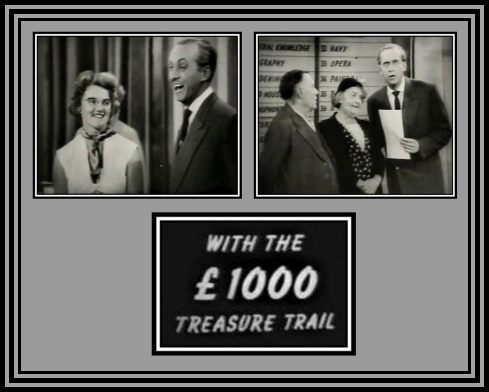 Top: Hughie Green with some contestants
Top: Hughie Green with some contestants
-oOo-
Introduction to the first programme
I remember often hearing kids singing this Introduction when I was younger:
Double your money and try to get rich,
Double your money without any hitch,
Double your money, it’s your lucky day,
Double your money and take it away.
-oOo-
Occasionally, the programme was presented on stage and one episode was recorded in Moscow in November 1966. The production company had been invited to bring the programme to the U.S.S.R. and was the first such programme to be presented there.

-oOo-
Jackie replaced the organist Robin Richmond as resident organist on the programme who had been with the programme since its early days. Once Jackie became a member of the show, he remained with it until it was taken off the air.
During the programme, Jackie provided Mood Music to help increase the tension of the moment.
The Double Your Money signature tune
together with an example of Mood Music played by Andrew Gilbert
-oOo-
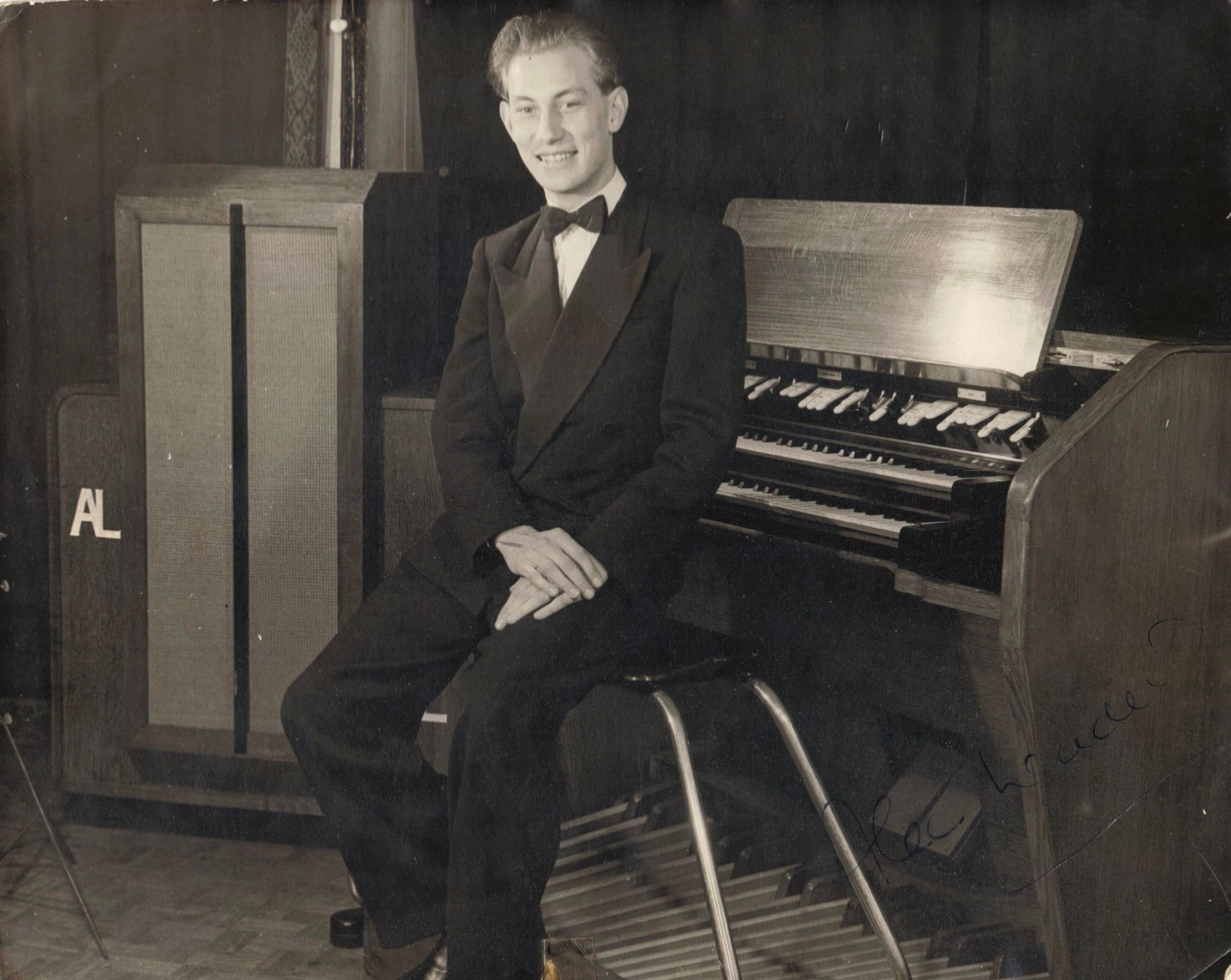 Alec Leader
Alec Leader
Photograph provided by his son, Mr. Phil Leader
ANDREW GILBERT says: Alec Leader (1933-1998) was the first organist to provide the theme music, which he had written for the programme when it was aired on Radio Luxembourg. Mr. Leader played it on the Jennings J2 Organ and continued with series throughout its broadcast on the radio and for its first season on television. After that Robin Richmond provided the musical accompaniment, playing a Hammond Organ, and later by Jackie.
-oOo-

Between 1971 and 1974, Jackie was associated with a second game show co-hosted by Hughie Green, The Sky’s The Limit, which was produced by Yorkshire Television for ITV.
 Yorkshire Television Logo
Yorkshire Television Logo
The programme was a travel-themed version of Double Your Money where contestants were required to answer multi-part questions on their specialist subject. The contestants could win money and also miles, which were redeemed for travel. The more advanced questions were answered from a Soundproof Box and with The Top Prize being 21,000 miles together with £600.
The Theme written by Norman Newell (1919-2004) and recorded by Simplicity
Jackie was engaged as organist for this programme and provided the incidental and Mood Music. Given his past connections with Farfisa, the electronic organ maker, he would normally play a Professional Duo Portable Organ manufactured by the Company on the show. However, on some later shows, he played a Lowrey Electronic Organ.
One of Mr. Green’s co-hosts, Audrey Graham, was a singer and was regularly given a solo spot, where she was accompanied by Jackie at the organ.
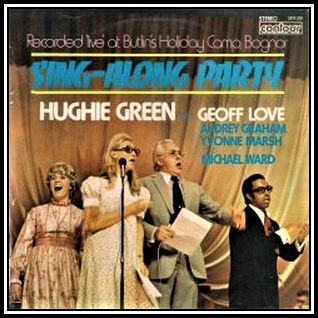
Ms Graham, along with Mr. Green and other members of the cast of the show, recorded an album while at Butlin’s Holiday Camp at Bognor Regis. It is quite possible that Jackie accompanied them on that album especially since one of Jackie’s daughters, Julie, recalls going to a Butlin’s Camp as a child along with her sister and parents.
-oOo-

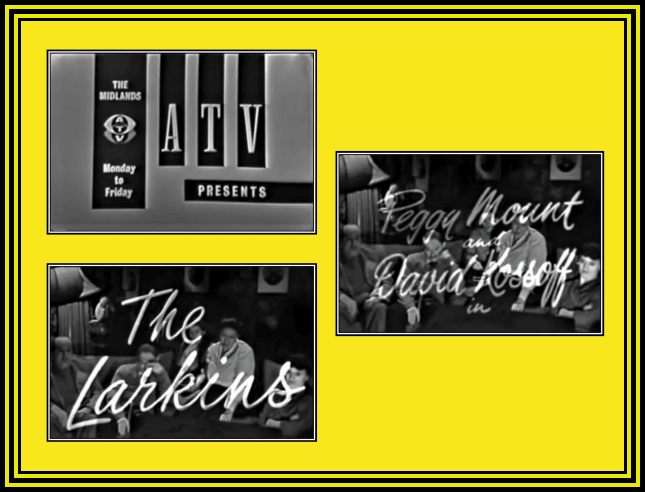
In 1958, Jackie provided the theme music for the successful Associated Television (ATV) series, The Larkins. The programme aired for four seasons between 1958 and 1960 and then for a further two seasons from 1963 and 1964.

The Theme Music – The Intro & The Outro
-oOo-
 The Larkin Family
The Larkin Family
The Larkins was a very popular comedy series starring Peggy Mount (1915-2001; seated at the right), as the formidable wife-cum-matriarch of the family and who was especially notable for her ability to speak in a powerful voice. Her hen-pecked husband was played by David Kossoff (1919-2005; standing at the left).
Both principles were successful actors prior to the making of the series. Ms Mount had received great acclaim for the stage and film version of Sailor Beware (1955) and Mr. Kossoff for his film work including the Oscar-winning short film, The Bespoke Overcoat (1956).
-oOo-
In addition to these successful programmes, Jackie was associated with other Television programmes, some of which were successful while others were not.
-oOo-
Jackie was involved with the BBC programme, Laugh Line, which aired between 1960 and 1961. Only eleven episodes of the programme aired. Unfortunately. I have not been able to find any information on this programme other than it was a Comedy and Game Show.
-oOo-
Another programme that Jackie was involved with was Meet Lionel Bart with David Gell in 1962. Again I have not been fortunate enough to find out anything about this programme.
Lionel Bart (1930-1999) was a writer and composer, who wrote amongst his many compositions, the musical Oliver, first produced on the stage in 1960 and filmed in 1968. David Gell (1929) was a radio and television presented until he retired in 1978.
-oOo-
Jackie provided the musical accompaniment for the BBC Television comedy programme, The Valiant Varneys, which aired between 1964 and 1965. Apparently only fifteen episodes were produced.
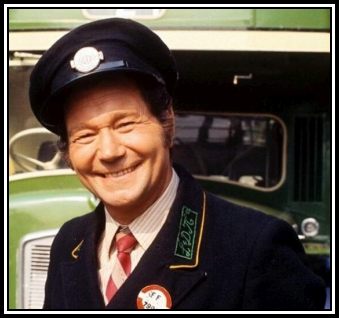 Reg Varney (1916-2008)
Reg Varney (1916-2008)
The programme starred Reg Varney playing a series of his own ancestors. Mr. Varney had found great success in the BBC television series, The Rag Trade (1961-1963; 1977-1978). He also is fondly remembered by viewers for the London Weekend Television (ITV) series, On the Buses, which aired between 1969 and 1973.
-oOo-

Jackie also worked on the 1964 edition of BBC’s Christmas Night with the Stars. This programme was broadcast each Christmas night periodically between 1958 and 1972. The show was hosted each year by a leading star of BBC TV and featured specially made short seasonal editions of the previous year’s most popular BBC Sitcoms (situational comedy) and light entertainment programs.
In 1964, The Billy Cotton Band Show appeared on the broadcast.
Christmas Night with the Stars, 1964 – The Billy Cotton Band Show segment
-oOo-
Jackie’s final work for Television was with a play for Thames Television (an ITV franchise) in 1972, entitled Three in a bed. The play was written by Brian Chasser and Mike Firman and starred John Barrard (1924-2013) and Roy Barraclough (1935-2017). Jackie wrote and provided the music, as well as appearing as a pub organist. The play dealt with the rivalry between the patrons of two Public Houses, The Ploughman’s Boots and The Lady’s Garter, which was to be settled by a game of Darts.
—oooOooo—
ACKNOWLEDGEMENTS
I would like to thank Mr. Andrew Gilbert for his Mood Music piece and also together with Mr. Michael Wooldridge and Mr. Keith Beckingham for their help in the writing of this page. I would also like to thank Mr. Phil Leader for providing the photograph of his father.
